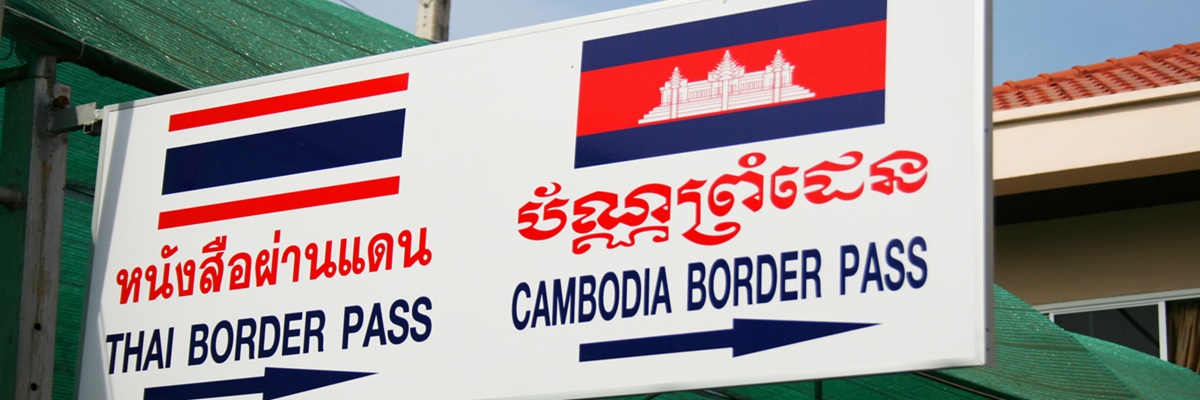Defense & Security
Fault Lines Exposed: Cambodia Dispute Triggers Political Turmoil in Thailand

Image Source : Shutterstock
Subscribe to our weekly newsletters for free
If you want to subscribe to World & New World Newsletter, please enter
your e-mail
Defense & Security

Image Source : Shutterstock
First Published in: Jul.01,2025
Jul.07, 2025
A leaked phone call, renewed clashes, and political brinkmanship have transformed a long-standing border dispute into a test of the Thai PM’s leadership, Cambodia’s assertiveness, and ASEAN’s credibility as a mediator in conflicts.
Thailand finds itself in the eye of a growing political and diplomatic storm. What began as a deadly border clash in late May—with the killing of a Cambodian soldier in the contested Chong Bok region—has rapidly escalated into a full-blown national crisis culminating in a Thai Constitutional Court asking Prime Minister Paetongtarn Shinawatra to step down on 1 July. The skirmish reignited deep-rooted tensions over unresolved territorial claims and historical rivalries, but a leaked phone call lit the fuse.
On 18 June, Cambodian Senate President and former Prime Minister Hun Sen released a 17-minute, 6-second phone call with Thai PM Paetongtarn on social media—unfiltered and explosive. The recording, confirmed as authentic by Paetongtarn after a public apology, included remarks that appeared critical of Thai military leadership and referenced her Cambodian counterpart as ‘uncle’, sparking outrage and shaking the foundations of her fragile coalition.
The political fallout was immediate as the Bhumjaithai Party, a key coalition partner with 69 seats, pulled out the same day, triggering a government crisis. Calls for fresh elections erupted, protests spread nationwide, and ethics complaints flooded. Senate President Mongkol Surasajja responded by filing a petition with the Constitutional Court, questioning the PM's fitness to govern and requesting her removal due to alleged ethical misconduct and constitutional violations.
In a firmer move on 24 June, Thailand sealed all land border crossings with Cambodia, allowing only students, medical cases, and urgent humanitarian travel. All other movements—tourism, trade, and casual transit—have been suspended indefinitely.
Still, Paetongtarn has refused to back down. Calling for national unity and holding on to sovereignty, she remained defiant. She called the leak by the Cambodian counterpart a breach of diplomatic etiquette and trust, prompting Thailand’s Foreign Affairs Ministry to hand a letter of protest to the Cambodian ambassador. In a firmer move on 24 June, Thailand sealed all land border crossings with Cambodia, allowing only students, medical cases, and urgent humanitarian travel. All other movements—tourism, trade, and casual transit—have been suspended indefinitely.
The crisis deepened further on 1 July, with Thailand’s Constitutional Court ordering Paetongtarn to step aside for up to 15 days while it examines the mounting allegations against her. Deputy Prime Minister Suriya Jungrungruangkit has been appointed to serve in an acting capacity during this period. With tensions simmering at home and diplomacy fraying abroad, understanding the evolving dynamics between Thailand and Cambodia and their implications is essential at this juncture.
Historical Background of Border Tensions
Historically, Thailand and Cambodia have shared a dispute over a small section of the 817 km land boundary, particularly concerning the area around the Preah Vihear Temple, which the Thais call Phra Viharn. The dispute's origins can be traced back to the 20th century under French colonial rule, when Thailand (then Siam) signed a border treaty demarcating the northern frontiers between the two. In the years leading up to 1953, when Cambodia gained independence from France, the region changed hands many times.
After its independence, Thai troops occupied the region in 1954. In response, Cambodia brought the dispute before the International Court of Justice (ICJ), which, in 1962, ruled in favour of Cambodia. However, Thailand did not accept the ICJ’s judgment, challenging the interpretation of the 1907 map presented as evidence. Thailand specifically maintained that it had never officially recognised the 1907 map, even though it had been used over an extended period, and asserted that the ICJ’s judgment applied solely to the immediate temple grounds, not the broader border region. In 2013, at the request of the Cambodian government, the ICJ reiterated its 1962 judgement, highlighting Cambodia’s sovereignty over the entire temple complex and urging Thailand to withdraw its troops from the area.
The dispute gained renewed attention when Cambodia sought to register Preah Vihar as a UNESCO World Heritage Site in 2008, and again in 2011 when about 40 people were killed after troops on both sides exchanged fire.
The boundary issue has resurfaced repeatedly at various points, leading to routine diplomatic breakdowns between the countries. For instance, in 2008 and 2011, Cambodia and Thailand were at loggerheads over the border issue. The dispute gained renewed attention when Cambodia sought to register Preah Vihar as a UNESCO World Heritage Site in 2008, and again in 2011 when about 40 people were killed after troops on both sides exchanged fire.
Present-day Calculations
While the phone call has been a flashpoint of contention, raising questions about Thai governance, it was framed by the Thai PM as a negotiation tactic driven by a deep-seated desire to see peace prevail. However, sidestepping official diplomatic channels has made her vulnerable to political backlash and damaged her reputation.
Unlike formal state visits or official talks, private conversations lack diplomatic protections, leave no official record, and offer no framework for managing the fallout. Once exposed, they can quickly be turned into tools for political attack. That is precisely what ensued. Facing mounting criticism, Paetongtarn has shifted from a conciliatory approach to firmer action. Casinos in Phnom Penh and other Cambodian border towns, which form a significant part of the country's tourism industry and attract Thai visitors, are now under scrutiny. On 23 June, citing national security concerns, Thailand announced a ban on the movement of vehicles, tourists, and traders through land border checkpoints across seven provinces bordering Cambodia.
Paetongtarn also announced her government’s intention to collaborate with international partners and regional bodies to combat cybercrime networks in Southeast Asia. Earlier this year, Thailand took action against Myanmar-based scam centres by cutting electricity, internet, and gas supplies to border towns where online scam operations were based. A similar approach is now being extended to Cambodia, with essential cross-border supplies to suspected scam hubs set to be blocked.
To stabilise the fragile coalition, the government has initiated a cabinet reshuffle to redistribute key ministerial roles and restore political balance. Compounding this political turbulence are anti-government protesters and royalists who have been holding demonstrations, asking for the resignation of the PM. The crisis has thus become more than a bilateral dispute. It is now a test of Thailand's coalition stability, the prime minister's credibility, and the balance between civilian and military relations. While diplomatic channels remain open, Thailand's capacity to navigate the crisis will continue to be constrained by its domestic political fragility.
The crisis has thus become more than a bilateral dispute. It is now a test of Thailand's coalition stability, the prime minister's credibility, and the balance between civilian and military relations.
On the other hand, Cambodia has reciprocated with various measures, such as taking legal recourse, reciprocating through political actions, and showing a strong military posture. Cambodia has again approached the ICJ, claiming a sovereign right over the temple's territorial areas, despite Thailand's request to resolve the issue bilaterally. Speaking on the issue, Hun Sen said that “our position to go to the ICJ has not changed”, declaring his intent to resolve the dispute over the Ta Moan Thom, Ta Moan Tauch, Ta Krabei temples and the emerald triangle area through the ICJ. This is an attempt by Cambodia to draw attention to the legal dimension of the dispute, highlighting Thailand’s unwillingness to accept ICJ judgements and its alleged violation of international law.
Furthermore, while visiting the frontlines, Cambodian PM Hun Manet (also the son of Hun Sen) inspected the situation and called for ‘resolving border disputes peacefully.’ However, Hun Sen took a stronger position, instructing the military to dig trenches and prepare for both defensive and offensive operations. He has also escalated the confrontation into the political arena, reportedly threatening to “expose” former Thai Prime Minister Thaksin Shinawatra, signalling his capacity to destabilise Thailand’s domestic politics.
Apart from this, the country has stopped imports of oil, gas, fruits and vegetables from Thailand, and has stopped using the Thai internet services. The Cambodian Foreign Minister has also advised citizens to avoid travelling to Thailand.
This border episode presents Cambodian PM Hun Manet with an opportunity to consolidate his domestic political support. The decision to pursue the dispute at the ICJ aligns with this political strategy, as do Hun Sen’s more assertive political tactics.
Implications of the Border Tensions
The resurgence of border tensions between Thailand and Cambodia has significant bilateral and regional implications. Bilaterally, the crisis has strained diplomatic relations and disrupted essential cross-border trade, harming vulnerable border communities. For Thailand, this comes during political instability, where internal coalition politics and tensions between military and civilian actors shape foreign policy. The controversy may erode regional confidence in Thailand's diplomatic posture, particularly its ability to manage neighbourly ties with ASEAN constructively.
While the upcoming ASEAN Foreign Ministers’ meeting in July may address this issue, the prospects for diplomatic intervention remain uncertain.
For Cambodia, while the government has shown diplomatic restraint and a willingness to engage through the Joint Boundary Commission, it has also responded forcefully by halting Thai imports and asserting its sovereignty. The move to potentially internationalise the dispute through the ICJ may further test ASEAN's non-interventionist norms.
Regionally, the tensions challenge ASEAN's capacity for conflict resolution and border management, especially as its centrality is often undermined by its consensus-driven inaction and a non-interventionist outlook. The crisis underscores the bloc's limitations in de-escalating intra-regional disputes. While the upcoming ASEAN Foreign Ministers’ meeting in July may address this issue, the prospects for diplomatic intervention remain uncertain.
With no formal ASEAN mediation, unresolved historical disputes continue to overshadow cross-border cooperation in Southeast Asia. As infrastructure connectivity and regional integration deepen, such tensions reveal the fragility of ties when nationalism, strategic missteps, and domestic politics converge. Whether Thailand and Cambodia can prevent this flare-up from turning into a renewed phase of prolonged conflict depends on the durability of their diplomatic mechanisms—and their political will to prioritise dialogue over posturing.
First published in :

Sreeparna Banerjee is an Associate Fellow in the Strategic Studies Programme.
Her work focuses on the geopolitical and strategic affairs concerning two Southeast Asian countries, namely Myanmar and Thailand. Her primary focus is on the Rohingya issue within the Bay of Bengal region. Additionally, her research delves into connectivity initiatives within the Bay of Bengal region. She is pursuing doctoral studies on the Rohingya Issue at West Bengal State University.
Sreeparna was previously a Research Intern with Saciwaters (2015) and a Guest Lecturer at Basanti Devi College (2014-2015).
Sreeparna is a doctoral candidate in International Relations at West Bengal State University and has completed her M.A. and B.A. in Sociology from Calcutta University. Her research has been published in books and peer-reviewed journals. In addition to her regular research at ORF, she contributes to and has been quoted by online and print platforms such as The Hindu, The Hindu Business Line, The Times of India, The Print, The Financial Express, Voice of America English News, Money Control and East Asia Forum, among others.
PhD Scholar, West Bengal State University, 2022

Abhishek Sharma is a Research Assistant with ORF’s Strategic Studies Programme. His research focuses on the Indo-Pacific regional security and geopolitical developments with a special focus on Northeast Asia.
He worked as a Research Associate with the Centre for Air Power Studies (CAPS). He has been a Non-Resident Kelly Fellow with Pacific Forum and NASC Fellow with Takshashila Institution. Abhishek graduated in International Relations from South Asian University in 2021. His writings have been featured in several publications including Lowy Institute, Nikkei Asia, East Asian Forum, Binding Hook, NK News, South Korea Pro, and SCMP. He has also published for peer-reviewed journal.
Unlock articles by signing up or logging in.
Become a member for unrestricted reading!